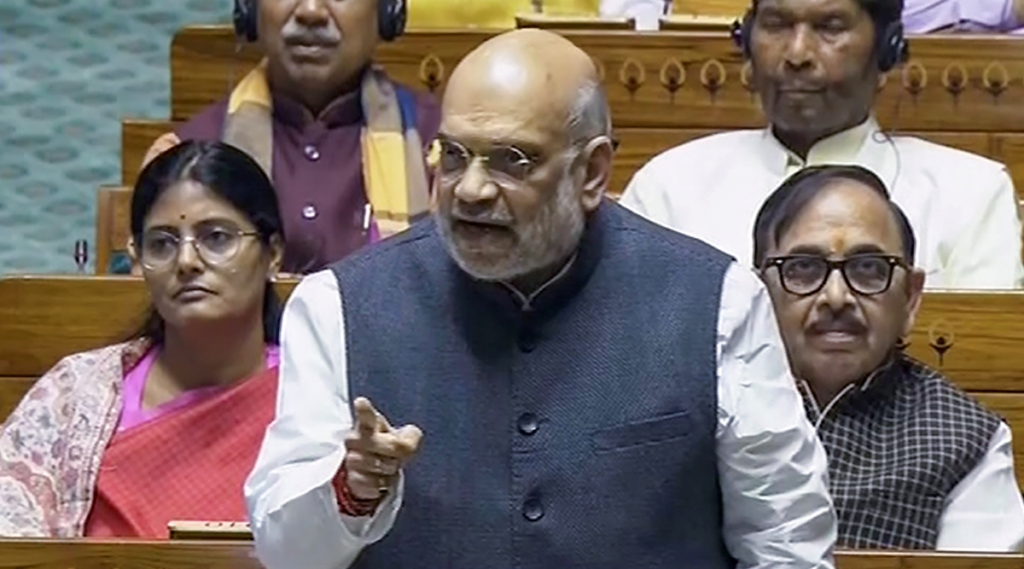
DOGRA HERALD BUREAU
NEW DELHI, Dec 5
While replying to TMC MP Saugata Ray’s on J-K bills debate in Lok Sabha on Tuesday, Union Home Minister Amit Shah countered him asking how can a country have two PMs, two constitutions and two flags?
The Lok Sabha was debating on the Jammu and Kashmir Reservation (Amendment) Bill, 2023 and the Jammu and Kashmir Reorganisation (Amendment) Bill, 2023.
“How can a country have two PMs, two constitutions and two flags? Those who did this, they did wrong. PM Modi corrected it. We have been saying since 1950 that there should be ‘Ek Pradhan, Ek Nishan, Ek Vidhan’ (One Prime Minister, one flag and one Constitution) in the country, and we did it.” HM Shah was speaking on remarks made by TMC MP Saugata Ray’s on J-K bills,” Home Minister Shah said in Lok Sabha.
Lok Sabha member Sougata Ray remarked during the discussion on The Jammu & Kashmir Reservation (Amendment) Bill, 2023 and The Jammu and Kashmir Reorganisation (Amendment) Bill, 2023 in Lok Sabha.
“Let me start with the situation in Jammu and Kashmir since Amit Shah took over as Home Minister. One of the major steps taken by him was to abrogate Article 370 and then convert the states of Jammu and Kashmir to Union Territories. First Jammu and Kashmir and second, Ladakh. Earlier, Union Territories were converted into States and here, Amit Shah converted the states into Union Territories. What have you achieved?” he added.
“If there is no Legislative Assembly, then why are you making the changes? Have a Legislative Assembly and then make it. I don’t know what the hurry is; the hurry should be to hold the elections in Jammu and Kashmir,” he added.
“They abrogated Article 370 just to fulfil the BJP promise: ‘Ek Pradhan, Ek Nishan, Ek Vidhan’ (One Prime Minister, one flag and one Constitution). This was the slogan at the time of Shayama Prasad, this is not for the people of Jammu and Kashmir, as this was a political statement and was his slogan,” he said.
Syama Prasad Mukherjee, who was India’s first Minister for Industry and Supply in Jawaharlal Nehru’s cabinet.
Meanwhile, Union Minister Anurag Thakur said that earlier in Jammu and Kashmir, their were stone-pelting incidents in Kashmir but today there are no such incidents.
“Earlier there were stone-pelting incidents in Kashmir. Today there are no such incidents. Today, not only at Lal Chowk but the Indian flag is hoisted in every lane in Kashmir,” Thakur said.
The Jammu and Kashmir Reservation (Amendment) Bill, 2023, was introduced in Lok Sabha on July 26, 2023. It amends the Jammu and Kashmir Reservation Act of 2004.
The Act provides for reservation in jobs and admission in professional institutions to members of Scheduled Castes, Scheduled Tribes, and other socially and educationally backward classes.
The key features of the Bill comprise socially and educationally backward classes that include people residing in villages declared as socially and educationally backwards by the Union Territory (UT) of Jammu and Kashmir, people residing in areas adjoining the Actual Line of Control and International Border, and weak and under-privileged classes (social castes), as notified.
The government may make inclusions or exclusions from the category of weak and under-privileged classes, on the recommendations of a Commission.
The Bill substitutes weak and under-privileged classes with other backward classes as declared by the UT of Jammu and Kashmir. The definition of weak and underprivileged classes is deleted from the Act.
The Jammu and Kashmir Reorganisation (Amendment) Bill, 2023 was introduced in Lok Sabha on July 26, 2023. The Bill amends the Jammu and Kashmir Reorganisation Act, 2019. The Act provides for the reorganisation of the state of Jammu and Kashmir into the union territories of Jammu and Kashmir (with legislature) and Ladakh (without legislature).
The Second Schedule of the Representation of the People Act of 1950 provides for the number of seats in legislative assemblies. The 2019 Act amended the Second Schedule of the 1950 Act to specify the total number of seats in the Jammu and Kashmir Legislative Assembly to be 83.
It reserved six seats for Scheduled Castes. No seats were reserved for Scheduled Tribes. The Bill increases the total number of seats to 90. It also reserves seven seats for Scheduled Castes and nine seats for Scheduled Tribes.
The Bill adds that the Lieutenant Governor may nominate up to two members from the Kashmiri migrant community to the Legislative Assembly. One of the nominated members must be a woman. Migrants are defined as persons who migrated from the Kashmir Valley or any other part of the state of Jammu and Kashmir after November 1, 1989 and are registered with the Relief Commissioner.
Migrants also include individuals who have not been registered due to being in government service in any moving office, having left for work, or possessing immovable property at the place from where they migrated but are unable to reside there due to disturbed conditions.
The Bill adds that the Lieutenant Governor may nominate to the Legislative Assembly one member representing displaced persons from Pakistan-occupied Jammu and Kashmir.
Displaced persons refer to individuals who left or were displaced from their place of residence in Pakistani-occupied Jammu and Kashmir and continue to reside outside such place.
Such displacement should have taken place in 1947-48, 1965, or 1971 due to civil disturbances or fear of such disturbances. These include successors-in-interest of such persons.


























